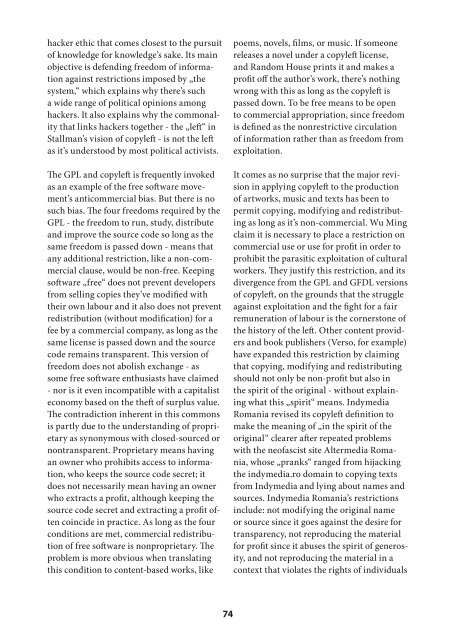You also want an ePaper? Increase the reach of your titles
YUMPU automatically turns print PDFs into web optimized ePapers that Google loves.
hacker ethic that comes closest to the pursuit<br />
of knowledge for knowledge’s sake. Its main<br />
objective is defending freedom of information<br />
against restrictions imposed by „the<br />
system,“ which explains why there’s such<br />
a wide range of political opinions among<br />
hackers. It also explains why the commonality<br />
that links hackers together - the „left“ in<br />
Stallman’s vision of copyleft - is not the left<br />
as it’s understood by most political activists.<br />
The GPL and copyleft is frequently invoked<br />
as an example of the free software movement’s<br />
anticommercial bias. But there is no<br />
such bias. The four freedoms required by the<br />
GPL - the freedom to run, study, distribute<br />
and improve the source code so long as the<br />
same freedom is passed down - means that<br />
any additional restriction, like a non-commercial<br />
clause, would be non-free. Keeping<br />
software „free“ does not prevent developers<br />
from selling copies they’ve modified with<br />
their own labour and it also does not prevent<br />
redistribution (without modification) for a<br />
fee by a commercial company, as long as the<br />
same license is passed down and the source<br />
code remains transparent. This version of<br />
freedom does not abolish exchange - as<br />
some free software enthusiasts have claimed<br />
- nor is it even incompatible with a capitalist<br />
economy based on the theft of surplus value.<br />
The contradiction inherent in this commons<br />
is partly due to the understanding of proprietary<br />
as synonymous with closed-sourced or<br />
nontransparent. Proprietary means having<br />
an owner who prohibits access to information,<br />
who keeps the source code secret; it<br />
does not necessarily mean having an owner<br />
who extracts a profit, although keeping the<br />
source code secret and extracting a profit often<br />
coincide in practice. As long as the four<br />
conditions are met, commercial redistribution<br />
of free software is nonproprietary. The<br />
problem is more obvious when translating<br />
this condition to content-based works, like<br />
74<br />
poems, novels, films, or music. If someone<br />
releases a novel under a copyleft license,<br />
and Random House prints it and makes a<br />
profit off the author’s work, there’s nothing<br />
wrong with this as long as the copyleft is<br />
passed down. To be free means to be open<br />
to commercial appropriation, since freedom<br />
is defined as the nonrestrictive circulation<br />
of information rather than as freedom from<br />
exploitation.<br />
It comes as no surprise that the major revision<br />
in applying copyleft to the production<br />
of artworks, music and texts has been to<br />
permit copying, modifying and redistributing<br />
as long as it’s non-commercial. Wu Ming<br />
claim it is necessary to place a restriction on<br />
commercial use or use for profit in order to<br />
prohibit the parasitic exploitation of cultural<br />
workers. They justify this restriction, and its<br />
divergence from the GPL and GFDL versions<br />
of copyleft, on the grounds that the struggle<br />
against exploitation and the fight for a fair<br />
remuneration of labour is the cornerstone of<br />
the history of the left. Other content providers<br />
and book publishers (Verso, for example)<br />
have expanded this restriction by claiming<br />
that copying, modifying and redistributing<br />
should not only be non-profit but also in<br />
the spirit of the original - without explaining<br />
what this „spirit“ means. Indymedia<br />
Romania revised its copyleft definition to<br />
make the meaning of „in the spirit of the<br />
original“ clearer after repeated problems<br />
with the neofascist site Altermedia Romania,<br />
whose „pranks“ ranged from hijacking<br />
the indymedia.ro domain to copying texts<br />
from Indymedia and lying about names and<br />
sources. Indymedia Romania’s restrictions<br />
include: not modifying the original name<br />
or source since it goes against the desire for<br />
transparency, not reproducing the material<br />
for profit since it abuses the spirit of generosity,<br />
and not reproducing the material in a<br />
context that violates the rights of individuals


